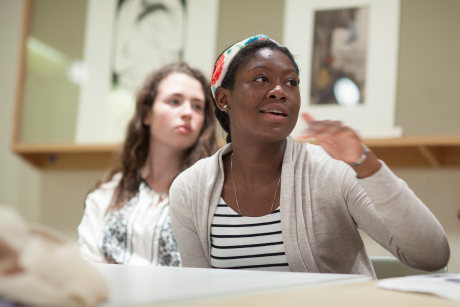'Clash' novel inspires discussions of identity, difference
By Daniel Aloi

Gather a group of people from varying backgrounds in one place, get them talking and watch their different perspectives emerge.
That is one outcome of the New Student Reading Project at Cornell and a central theme of this year’s selection, “Clash of Civilizations Over an Elevator in Piazza Vittorio” by Amara Lakhous.
At locations across campus Aug. 25, faculty, staff and administrators facilitated small group discussions of the book with first-year and new transfer students who read it over the summer.
The book is centered on its characters’ expressions of cultural identity and how they perceive each other. Most are immigrants living in Rome, and some think that Amedeo, an Algerian with a troubled past who has assimilated into Roman society, is himself Italian because he knows the city so well.
“The idea of identity plays into why this book was chosen, I think,” said Flaminia Cervesi, professor of Romance studies, in a discussion in Lincoln Hall with 13 first-year students. “You all come in, new students to a new place, and it’s a question of how you relate, what identity you bring, and who are you going to become.”
In the book, the testimony from a succession of Piazza Vittorio residents following a murder alternates with journal entries by Amedeo, on whom everyone else seems to project acceptance or respect – he’s a blank slate, having revealed little about himself to them.
“To me, Amedeo represents the hope that things can change,” said engineering major Daniella Blyakhman ’18.
Biology major April Lee ’18 observed, “Amedeo’s nightmares made me think you can never get rid of your past.”
“The more he is assimilated and trying to escape the terror of his past in Algeria, [the more] it just catches up with him – there is no escaping it,” Cervesi agreed.
The residents also reveal individual prejudices and their inability to get along with each other as they talk about their struggles, their neighbors and the arguments stemming from the use of an elevator in their building.
“One of the recurrent phrases in the book is ‘I am not racist, but …,’” Cervesi said.
“The characters were similar in that they all hated one thing,” said Jamie Bonan ’18, an English major.
Biochemistry major Sarah Ditton ’18 asked: “Are the depictions of racism in the book accurate?”
“Piazza Vittorio is a very special place,” Cervesi said. “It’s traditionally a hub for non-Italians, non-natives, a place where you find different cultures and nationalities. That’s a place where it started, but it’s happening all over Italy now.”
Italy is still geographically divided as well, she said, and Lakhous has voiced his pessimism about the possibility of integrating immigrants into Italian society.
The author, like Amedeo, is an Algerian immigrant living in Rome. Fluent in several languages, he wrote and published a version of the story in Arabic under a different title, then revised and rewrote it in Italian. The English translation was published in 2008.
Cervesi has read the book in both Italian and English. “The original is a lot more colorful and had the Italian dialect,” she said. “A good translation should keep that. I think the writing is very central – [the book] has to do with perceptions of others through language.”
Lakhous will visit Cornell to discuss the book in a free, public lecture Nov. 4 at 4:30 p.m. in Kaufmann Auditorium, Goldwin Smith Hall. The author’s visit is sponsored by the Cornell Institute for European Studies.
“‘Clash’ has given us a lot to think and talk about, as we start the term alongside our new students this fall,” said Laura Brown, senior vice provost for undergraduate education. “I’m very grateful to the faculty and staff facilitators who joined us in leading student discussions at Orientation.”
Media Contact
Get Cornell news delivered right to your inbox.
Subscribe